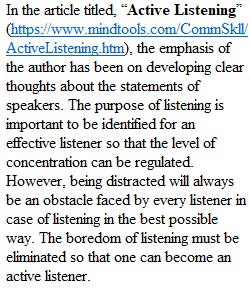


Q There is so much more to listening than most people realize! Active listening is a valuable skill to develop for our professional and personal lives. Our textbook talks about many things that can interfere with true listening - things like personal bias, distracters, fatigue, upbringing, faulty assumptions (jumping to the wrong conclusion!), and external noise are just a few examples. For this reflection, read an article about active listening (there are plenty to choose from online - just Google "active listening".) Review the characteristics of active listening, and why it is so important. Then take one of the listening assessments listed below: https://www.mindtools.com/pages/article/listening-quiz.htm (Links to an external site.) Listening Self-Assessment Page 178 in our textbook There are two parts to this assignment: Part 1: Write a half page summary of the article you read (include the link to the article). What is active listening? How do you become an active listener? Why is it important? Part 2: Write half page reflecting on your listening skills. What were the results of the assessment? Do you agree? How can you improve your listening skills? Grading: Content (10 points) - active listening summary and article link, self-assessment results Format (5 points) - spelling, grammar, length
View Related Questions